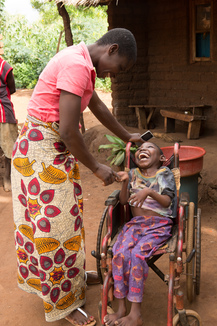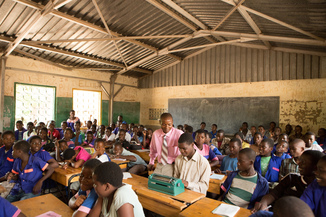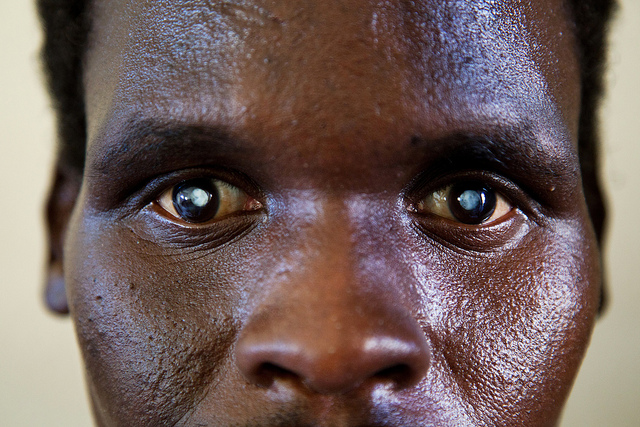Last Friday, the UK government responded to a report by its International Development Committee by announcing its most comprehensive commitment to disability in [...]]]>
Last Friday, the UK government responded to a report by its International Development Committee by announcing its most comprehensive commitment to disability in the context of international development policy yet.
Its decision to centrestage disability across its international work and collaborations is transformative in many ways: firstly, and most importantly, in terms of the impact it will have on many of the 800 million people living with disabilities in developing countries.
But also in the way in which the government’s Department for International Development (DfID) itself operates and impact it will have on the wider development community.
In its commitment to strengthening disability awareness in its policy, programming and international work, the government has been answering a call Sightsavers has been making through our Put Us in the Picture campaign since December 2013. By the end of the year, they will have recruited new staff, made specific new commitments in thematic areas and wrapped all this into a systematic disability framework. With the negotiations for the United Nations post-2015 development framework — the follow up to the Millennium Development Goals — just around the corner, it comes at a crucial time in global policy making.
In terms of direct impact on people with disabilities, DfID has recognised the fundamental right of people with disabilities to participate fully in decision-making processes and to have a voice in the development decisions that affect their daily lives. Including a wider, more representative, spectrum of voices in its disability advisory group is a huge step toward ensuring the voices of people with disabilities are heard within DfID. We know the value of this through our work on the Voices of the Marginalised pilot project, which aims to bring the perspectives of those living with disabilities, through participatory research, into global decision-making processes.

Emmanuel Makanjira, 13, receives outreach physiotherapy from Miriam Pharaoh. Credit: Peter Caton/ Sightsavers
DfID is also one of the world’s leading donors of education work across the planet, spending 630 million pounds on this sector in 2012/13. That makes it’s all the more important that they have committed to better understanding the educational needs of children with disabilities so that they have an equal opportunity to learn and succeed in school.
Greater attention to inclusion within DfID’s education programmes will mean thousands of children will be able to access education and make a better start in life.
DfID has also recognised the need for disaggregated data and stated that without data showing progress for all relevant income and social groups –including people with disabilities– no target for the post-2015 framework can be said to be met. This means effectively targeting people with disabilities and ensuring development programmes include those most in need.
This commitment across thematic areas is at the heart of an inclusive approach to development.
Alongside these announcements, which will directly impact people with disabilities, DfID plans to build their own capacity and expertise. This will include the appointment of a senior level champion and other staff who will work with expert groups and people with disabilities. This will strengthen their position as a global leader in this field and build on the fantastic commitment and leadership demonstrated by the current minister, Lynne Featherstone.
What’s more, DfId’s promise to hold bilateral and multilateral funding partners to account and encouraging them to do more to reach people with disabilities in their own programmes it’s a major step forward. DFID spends over 50 percent of its budget through multilateral agencies, so this could play a critical role in making these agencies more inclusive of disability.
Within the UK, DFID spends 150 million pounds a year through central funds allocated to UK NGOs and has promised to ensure that all of the programmes it funds through these mechanisms consider their impact on people with disabilities.
Finally, agencies in the UK and across the world will be encouraged and supported to include disability in their planning and implementation of development programmes. This could have an impact on people with disabilities’ access to water, to food security, education, health, legal services and so many other things that many of their peers are starting to realise.
The call for DFID to make concrete commitments to include people with disabilities has been growing over the last decade. 2014 marks the year where these calls have been heard.
We look forward to working with DfID to ensure people with disabilities are at the heart of the decisions to come, the impact of which could change the lives of millions.
 Dominic Haslam is Director of Policy and Strategic Programme Support for the development charity Sightsavers, which works in more than 30 developing countries to prevent blindness, restore sight and advocate for social inclusion and equal rights for people with disabilities www.sightsavers.net. He also sits on the steering committee of the Beyond 2015 Campaign.
Dominic Haslam is Director of Policy and Strategic Programme Support for the development charity Sightsavers, which works in more than 30 developing countries to prevent blindness, restore sight and advocate for social inclusion and equal rights for people with disabilities www.sightsavers.net. He also sits on the steering committee of the Beyond 2015 Campaign.
The potential for this to change the lives of people with disabilities living in poverty around the world should not be underestimated.
People with disabilities have been left behind
Around one [...]]]>
The potential for this to change the lives of people with disabilities living in poverty around the world should not be underestimated.
People with disabilities have been left behind
Around one billion people—or 15 percent of the world’s population—have a disability, and in many countries they are among the most excluded and hardest to reach of all groups in their community.
In 2000 world leaders agreed on an ambitious development framework consisting of eight Millennium Development Goals (MDGs). In the 14 years since those goals were set, we have seen some of the most important steps towards poverty elimination in, child deaths have fallen by more than 30 percent and deaths from malaria have fallen by one quarter.
One critical group, however, has been largely left out from this progress.
Almost 14 years on, the exclusion of disability from the MDGs has materially affected many people with disabilities as well as their families. They are less likely to have access to healthcare and education, and in turn find making a livelihood and escaping poverty that much more difficult, if not impossible.
Fifteen-year-old Nabirye from Uganda lost her sight aged nine, following an infection, and had to drop out of her school immediately as it didn’t have the equipment or teachers needed to support students with disabilities such as hers.
“I felt so bad leaving school. Now I don’t do anything, I just stay at home. When I was at school I liked science and English, I wanted to be a lawyer, but I have been a long time out of school now so I don’t think I can anymore.”
At 15 years old, she still has enormous potential, but with every day out of education a bit more of it is lost.
In 2015 a new development framework will be agreed by current world leaders, replacing the MDGs.
Last month the World Bank President, Dr. Jim Kim, spoke about the opportunity this generation has to end extreme poverty – within a generation. For those of us in international development, that’s inspiring but not achievable if people with disabilities continue to be excluded from development policy and process and don’t have a say in the issues that affect them.
And that is why the recommendations by the IDC on how the UK government, a leading development donor, develops its policies and spends its money are so critical.
DFID must seize this opportunity to lead the way on inclusive development
The work of the government’s Department for International Development (DfID) on disability and development has never before received such scrutiny from parliament and it is over a decade since the UK government announced new policy in this area.
If the opportunity presented by the select committee report is missed, it could be years before disability and development will receive this level of political attention again – leaving another generation excluded.
As a leading aid donor, the UK has a unique opportunity to influence the setting of the next global development goals, which will shape the lives of people for more than a generation. But to do this effectively the government needs to lead by example and ensure that UK aid is fully inclusive of people with disabilities.
In 2000, DfID broke new ground by being the first bilateral agency to explicitly address the link between poverty and disability. Yet, despite being an early champion of disability as a development issue, no concrete policy has since been formulated. The select committee’s inquiry identified this gap and was clear that what’s needed to reach the world’s poorest people was a ‘disability strategy with clear targets and timescales’. This echoes the campaign call of Sightsavers’ Put Us in the Picture campaign.
Solutions to inclusion
We recognise that inclusion is not an easy task. Detailed analysis is required in order to effectively target people with disabilities and ensure that they are not excluded from development policies and programmes. This is a challenge both governments and development agencies face.
As part of our support to this process, Sightsavers is piloting a project to disaggregate data by disability in Africa and Asia. This will help us understand how development programmes really can include those most in need and are delivering demonstrable results.
Another critical issue is that people with disabilities rarely have a voice in the development decisions that affect their lives. To address this there needs to be real and sustained engagement between aid agencies, as well as people with disabilities and their families. DfID must ensure disabled people participate fully in the design and delivery of its programmes.
The value of this is demonstrated by the work Sightsavers is doing through the Voices of the Marginalised pilot project, which aims to bring the perspective of those living with disabilities, through participatory research, into global decision-making processes.
Will we take this opportunity to act now?
The committee’s report offers hope and promise to people with disabilities around the world who do not currently have a voice in or benefit from UK aid.
However, this promise will remain unfulfilled if the UK Government does not come out with a positive, ambitious response that commits to prioritising people with disabilities in its development work through the implementation of a disability strategy.
We need to build on the progress that has been made so far and show leadership. We need to ensure the plans we put in place now, and which will impact on the lives of people globally for years to come, leave no one behind. We need to seize this opportunity or face letting down another generation.
 Dominic Haslam is Director of Policy and Strategic Programme Support for the development charity Sightsavers, which works in more than 30 developing countries to prevent blindness, restore sight and advocate for social inclusion and equal rights for people with disabilities www.sightsavers.net. He also sits on the steering committee of the Beyond 2015 Campaign.
Dominic Haslam is Director of Policy and Strategic Programme Support for the development charity Sightsavers, which works in more than 30 developing countries to prevent blindness, restore sight and advocate for social inclusion and equal rights for people with disabilities www.sightsavers.net. He also sits on the steering committee of the Beyond 2015 Campaign.

